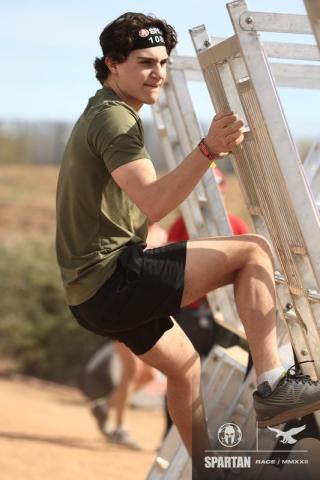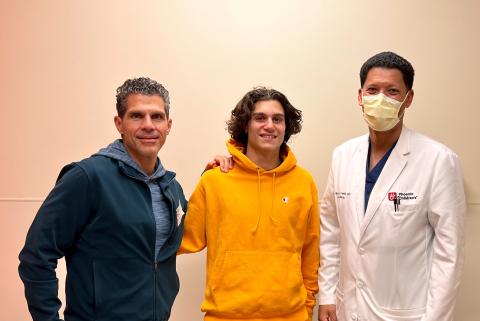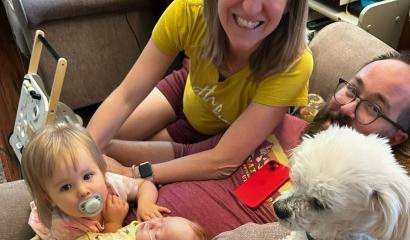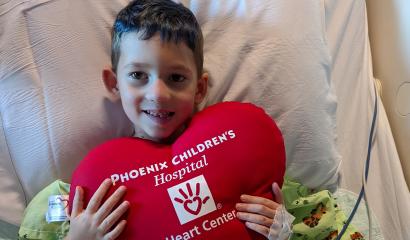Bright Futures
Articles and Updates from Phoenix Children's
The youngest of three children, Alex was always extraordinary. During a routine 20-week fetal ultrasound, Alex was diagnosed with hypoplastic left heart syndrome, a congenital heart defect where the left side of his heart was not fully developed. This is a rare heart condition that, before the evolution of complex heart surgery in infants, was uniformly fatal because the heart and aorta (the largest blood vessel in the body) do not develop and therefore do not pump blood to the body.
John remembers that day vividly. He recalled, "We were all crowded in this little room, my wife, my two little kids and me, and I noticed right away that his heart didn't look right on the screen. The doctor came in and said, ‘You need to see a fetal cardiac surgeon immediately.’ It was devastating."
Three open heart surgeries in two years
The family was told that Alex would need three open heart operations to correct the heart defect after he was born. Over a two-year period, Alex underwent the following procedures:
- Norwood procedure: Alex’s aorta was made larger to increase blood flow to his body, and a small tube (or shunt) was inserted to connect blood to flow from his heart to his lungs. The goal was to make the stronger side of his heart the main chamber to pump blood throughout his body.
- Glenn shunt: The tube inserted from the Norwood procedure was removed, and the large vein (superior vena cava) that brings blood from his head and arms back to his heart was connected to the pulmonary artery. This was important for the blood to get to his lungs for oxygen.
- Fontan procedure: With this procedure, the blood vessel that transmits deoxygenated blood from the lower part of his body into his heart (inferior vena cava) was connected to the pulmonary artery, which improved his blood’s oxygenation.
Alex’s first surgery was performed at a children’s hospital on the east coast when he was only 3 days old. He was in the hospital for a week. He recovered quickly and was sent home. Doctors monitored him closely, but he had no problems feeding or breathing. His weight was normal, and he continued to grow well.
“He had no health emergencies at all. At that age, Alex was actually easier on his mother and me when it came to his health than the other two," John remarked. But Alex still had to undergo the other two heart surgeries before he was 2 years old, the standard for babies born with hypoplastic left heart syndrome.
More surgeries were necessary, yet Alex took it all in stride
When he was about 8 years old, Alex had a fourth surgery to address an issue caused during a previous operation, along with another catheterization procedure as part of his Fontan connection. Then, when Alex was about 10, his doctors implanted a pacemaker. Again, he went through the surgery with flying colors, spent a week in the hospital and then went home to be an active, healthy kid.
"I think the pacemaker surgery was harder on me than him. He had been fine all his life, but the pacemaker really brought it home for me,” John said. “He is fine now, but there may be a time when he will not be and that was difficult to wrap my head around, Alex took it in stride.”
Nothing slows Alex down
The doctors always told Alex's family to let him be active. His body would tell him when he should slow down. And that is exactly what Alex did. In high school, he was active in basketball and swimming. His coaches were aware of his condition and put him in shorter sprint events instead of long distances. Alex was always up for trying something new.
That included moving to Arizona during his senior year in high school. A move across the country might have been stressful for any teenager, but Alex did it with ease. "He was calm, cool and collected through the whole move. He makes friends quickly and is one of the most easygoing people I know," John shared.
A new life in Arizona
Alex started visiting Phoenix Children's Center for Heart Care in the fall of 2021 under the care of cardiologist Wayne J. Franklin, MD, FACC. Alex sees Dr. Franklin annually for a stress test, cardiac ultrasound, pacemaker testing and complete check-up of his heart.
He'll return again this summer for another catheterization and a check on his heart. He also will need a liver biopsy soon because his reconstructed heart anatomy can impact the liver, but he will not be held back by these concerns.
A new challenge: the Spartan Race
In early 2022, Alex found the Spartan Race online and convinced his father to do it with him. "Just like any kid, I think Alex thought it would be an adventure. He wanted to say he did it because it was cool," John observed.
The Spartan Race is a series of 20 obstacle challenges of varying distance and difficulty. The obstacles require racers to have cardiovascular fitness, strength and mobility. Because of his sports background, Alex was already physically fit, but he spent a few months building more strength in the gym. On the day of the race, Alex and John completed every obstacle challenge together, including scaling a wall with a rope, a barbed wire crawl and jumping over a fire pit.
"It was a lot of fun,” John shared. “I was not worried that it was too much for him. I knew from past experience that he would go as far as he could and stop before getting into trouble. He knows his capabilities and his limits.”
Dr. Franklin exclaimed, "I saw a photo of Alex at the Spartan Race where he was jumping over a fire pit, and I thought, ‘Wow, this kid is seizing the day! What a go-getter!’”
Jordan D. Awerbach, MD, MPH, director of the Adult Congenital Heart Disease (ACHD) Program at Phoenix Children’s, continued, “We are so happy to see patients like Alex because it's important for parents of children with heart defects to know their kids can live healthy, active lives. Alex is a shining example of that."
Kids are living longer with congenital heart disease
The innovations in heart healthcare allow more patients like Alex to survive and thrive into adulthood. However, very few health systems specialize in treating ACHD. Phoenix Children's is the only hospital in the state to be accredited by the Adult Congenital Heart Association and is uniquely set up to treat patients like Alex well into adulthood.
Alex is now a freshman at the University of Arizona and is very active in his fraternity. He will transition his heart healthcare to the ACHD Program as he progresses through college and into adulthood. Dr. Franklin and Alex’s parents will be by his side to support him, but they are not worried about him. He has big plans, and they are sure he'll achieve all of them.
“He’s gotten excellent care here, and we feel great about his future,” John shared.
Learn more about Phoenix Children's Adult Congenital Heart Disease Program.





